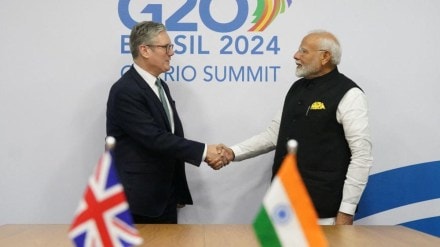India and the United Kingdom on Tuesday confirmed the conclusion of a landmark multi-billion-pound Free Trade Agreement (FTA), set to eliminate or reduce tariffs on 90% of traded goods between the two nations. The deal is projected to add £4.8 billion annually to the British economy by 2040.
Prime Ministers Narendra Modi and Keir Starmer held what officials described as a “very warm” phone conversation to confirm the agreement. The deal will now undergo legal text finalisation and be presented before the British Parliament for approval before coming into effect.
“Today we have agreed a landmark deal with India – one of the fastest-growing economies in the world – which will grow the economy and deliver for British people and businesses,” Starmer said in a statement.
The agreement was sealed following high-level talks in London between India’s Commerce Minister Piyush Goyal and UK Business and Trade Secretary Jonathan Reynolds.
Among the UK’s biggest gains are tariff reductions on Scotch whisky, which will be halved from 150% to 75%, and on cars, where duties will drop from 100% to 10% under a quota system. Other sectors benefiting include medical devices, advanced machinery, gin, and lamb.
Based on 2022 trade statistics, the department claims this amounts to India cutting tariffs worth over 400 million pounds when the deal comes into force, which will more than double to around 900 million pounds after 10 years.
“By striking a new trade deal with the fastest-growing economy in the world, we are delivering billions for the UK economy and wages every year and unlocking growth in every corner of the country, from advanced manufacturing in the North-East to whisky distilleries in Scotland,” said Reynolds.
“In times of global uncertainty, a pragmatic approach to global trade that provides businesses and consumers with stability is more important than ever,” he said.
The FTA is expected to increase bilateral trade, which stands at 41 billion pounds a year, by an additional 25.5 billion pounds, with UK wages up by 2.2 billion pounds each year in the long run.
“FTAs are notoriously complex, and this truly is a remarkable achievement that will serve both countries well. This agreement represents a significant milestone in UK-India relations, underscoring the potential of our partnership and the opportunities that lie ahead,” said Manoj Ladwa, Founder and Chairman of UK-based policy platform India Global Forum (IGF).
One of India’s key demands around a Double Contributions Convention will ensure that professionals in either country are not forced to pay national insurance or social security contributions in both countries.
On professional visas, the UK stressed that there would be no change to the UK immigration policy except to offer a more streamlined process for business mobility. India has also succeeded in additional categories such as chefs, musicians and Yogis for the UK’s professional visa routes.
India and the UK had restarted negotiations on an FTA this February after a pause in the three-year negotiations for general elections last year.
An accompanying Bilateral Investment Treaty (BIT), which was also being negotiated in parallel, has not gone over the line at this stage, but UK officials indicated that it is hoped that it will conclude soon too.
(With inputs from PTI)
